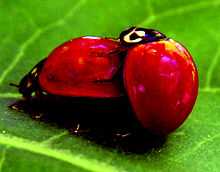Cycloneda sanguinea
From Wikipedia, the free encyclopedia
| Cycloneda sanguinea | |
|---|---|
 | |
| Mating Cycloneda sanguinea | |
| Scientific classification | |
| Kingdom: | Animalia |
| Phylum: | Arthropoda |
| Class: | Insecta |
| Order: | Coleoptera |
| Family: | Coccinellidae |
| Genus: | Cycloneda |
| Species: | C. sanguinea |
| Binomial name | |
| Cycloneda sanguinea (Linnaeus, 1763) | |
| Synonyms | |
|
Coccinella sanguinea Linnaeus, 1763 | |
Cycloneda sanguinea is a widespread species of ladybird beetle in the Americas.
Distribution
Cycloneda sanguinea is the most widespread ladybird beetle in Latin America,[1] with a distribution that ranges from the southern United States to Argentina,[2] and eastward to the Cayman Islands.[3] On the Galápagos Islands, it lives in sympatry with its sister species, Cycloneda galapagensis.[2]
Description
Cycloneda sanguinea is a large ladybird beetle with red, unspotted elytra (wing covers).[3] Its pupae have the remarkable ability to "bite" potential predators using a device known as a "gin trap".[4]
References
- ↑ Charles Leonard Hogue (1993). "Ladybird beetles". Latin American Insects and Entomology. University of California Press. pp. 275–276. ISBN 978-0-520-07849-9.
- ↑ 2.0 2.1 Stewart Blaine Peck (2006). "Family Coccinellidae. The Ladybird Beetles". The Beetles of the Galápagos Islands, Ecuador: Evolution, Ecology, and Diversity (Insecta: Coleoptera). NRC monograph publishing program. NRC Research Press. pp. 200–205. ISBN 978-0-660-19421-9.
- ↑ 3.0 3.1 R. R. Askew (1994). "Insects of the Cayman Islands". In M. A. Brunt & J. E. Davies. The Cayman Islands: Natural History and Biogeography. Volume 71 of Monographiae Biologicae. Springer. pp. 333–356. ISBN 978-0-7923-2462-1.
- ↑ Thomas Eisner, Maria Eisner & Melody Siegler (2005). "Cycloneda sanguinea. A ladybird beetle". Secret Weapons: Defenses of Insects, Spiders, Scorpions, and Other Many-legged Creatures. Harvard University Press. pp. 206–210. ISBN 978-0-674-01882-2.
This article is issued from Wikipedia. The text is available under the Creative Commons Attribution/Share Alike; additional terms may apply for the media files.